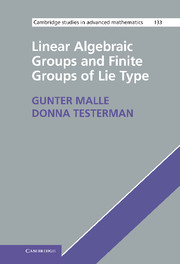Book contents
- Frontmatter
- Contents
- Preface
- List of tables
- Notation
- PART I LINEAR ALGEBRAIC GROUPS
- PART II SUBGROUP STRUCTURE AND REPRESENTATION THEORY OF SEMISIMPLE ALGEBRAIC GROUPS
- PART III FINITE GROUPS OF LIE TYPE
- Appendix A Root systems
- Appendix B Subsystems
- Appendix C Automorphisms of root systems
- References
- Index
PART III - FINITE GROUPS OF LIE TYPE
Published online by Cambridge University Press: 05 June 2012
- Frontmatter
- Contents
- Preface
- List of tables
- Notation
- PART I LINEAR ALGEBRAIC GROUPS
- PART II SUBGROUP STRUCTURE AND REPRESENTATION THEORY OF SEMISIMPLE ALGEBRAIC GROUPS
- PART III FINITE GROUPS OF LIE TYPE
- Appendix A Root systems
- Appendix B Subsystems
- Appendix C Automorphisms of root systems
- References
- Index
Summary
In this part we introduce and study finite analogues of the simple linear algebraic groups which were the subject of the first two parts. The construction of the various classical groups over algebraically closed fields in Section 1.2 generalizes in a straightforward way to give versions over arbitrary base fields. It is much less obvious how to obtain versions of the simple exceptional groups. This was first achieved by Chevalley [15] who showed how to construct analogues of all simple algebraic groups as automorphism groups of simple Lie algebras over any base field. Still this approach falls short of producing all versions in which we will be interested. For example, over an algebraically closed field there is just one class of non-degenerate orthogonal forms up to similarity in any dimension, while over arbitrary fields there may be many, with corresponding non-isomorphic isometry groups. Also, the isometry groups of unitary forms do not arise in Chevalley's setup.
Shortly after Chevalley's construction, Steinberg [68] presented a variation of this by considering fixed points of field automorphisms composed with algebraic group automorphisms. This allows one to recover the unitary groups, for example. But this wasn't yet the end of the story. In 1960 M. Suzuki discovered an infinite series of finite simple permutation groups which at that time did not seem to have any relation with algebraic groups. It was recognized in the same year by Steinberg how his construction could be generalized to yield these as subgroups of the four-dimensional symplectic group over an algebraically closed field of characteristic 2.
Information
- Type
- Chapter
- Information
- Linear Algebraic Groups and Finite Groups of Lie Type , pp. 179 - 180Publisher: Cambridge University PressPrint publication year: 2011
